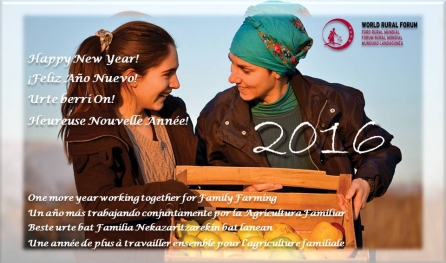Dear all,
A year has already passed since the end of the IYFF-2014 and the actions for Family Farming continue.
In 2015, we took an important step forward together, on guaranteeing the continuity of the International Year of Family Farming while opening new doors to the future.
In principle, we highlighted the decision that clearly defined a route to facilitating the continuity of the IYFF-2014, therefore preventing the subject from being forgotten.
The IYFF+10, which is the next step in this Family Farming campaign, follows the same objective (We need better public policies for Family Farming!) and it will hold gender equality and youth as its priorities. The work with the Family Farming National Committees, the creation of certain Guidelines for the promotion of Family Farming and improving the relationship between the Research Centres and the Family Farming Organisations are what this new stage hinges on. The IYFF+10 initiative was born from the agreement reached by Family Farming Organisations from the 5 continents on 14 and 15 November in Brasilia, with the support of different associations and Agricutltural Research Centres.
In this common objective of guaranteeing the continuity of the IYFF-2014, the V Global Conference “Let’s Build a Future: Family Farming”, held in Bilbao, north Spain, from 21 to 23 September, has allowed us to take an important step in involving various governments, international organisations, research centres and institutions of the Civil Society, who actively participated in this global event.
In this context and during 2015, we have been involved in many exciting advances with regards to the future. We have seen that the REAF (Specialized Meeting on Family Farming), which is made up of the governments and civil societies of Argentina, Uruguay, Chile, Paraguay, Ecuador and Venezuela, has been influenced by the IYFF+10 in the last two editions, while the Community of Portuguese Language Countries (Portugal, Angola, Mozambique, São Tomé and Príncipe, Cape Verde, Brazil, Guinea Bissau, Macao and East Timor), through its Council on Food and Nutrition Security, has officially supported the IYFF+10 initiative by signing a demonstration with the United Nations to declare the Decade of Family Farming. In the same declaration, the CPLP gladly received the creation process of the Guidelines in support of Family Farming.
At national level, we were happy to hear of the decision made this year by the National Committee of Congo to create the Family Farming Regional Committees, which in practice means increasing advocacy work and political dialogue on a sub-national level. 40 national committees continue working in 4 continents, clear in their aim to promote better public policies for Family Farming.
At the same time, the IYFF+10 has received a lot of positive news like that which arrived from Peru, with the passing (unanimously!) of the Framework Law for the Promotion and Sustainable Development of Family Farming (with significant participation of the country’s Family Farming National Committee), the Statute Law of Agricultural Woman in Euskadi, the decision to create the Family Farming Consultative Council in Paraguay, or the process of agricultural reform that has been produced in Senegal.
In a more internal context, the WRF continues to go from strength to strength, in using the General Assembly on 23 September 2015 to establish relevant Family Farming organisations as members. This was the case for New Zealand Young Farmers (NZYF), SEWA-India, CONFRAS-El Salvador, Rural Regional Dialogue Programme (PDRR) and the Small Farmers’ Union of Spain (UPA). A research centre such as the CIRAD and the Rural Association RELACC also became a part of the WRF family.
In 2015, despite the busy schedule, we also wanted to open new doors, especially in one area: Agricultural Youth and the generational replacement in the field. The critical situation in this area forces us to move forward and work harder for this area.
In South Africa, the average age in Family Farming is around 62 years old, while in sub-saharan Africa, the figure is closer to 60 years old. Half of the farmers in the United States are 55 years old or more.
As well as prioritising the subject in the IYFF+10 work agenda, the WRF Secretary has started to design an Initiative with various Regional Organisations of Farmily Farming across 3 continents.
We hope that you have a wonderful 2016, full of prosperity and progress for Family Farming.
Best regards,
Auxtin Ortiz
Director



